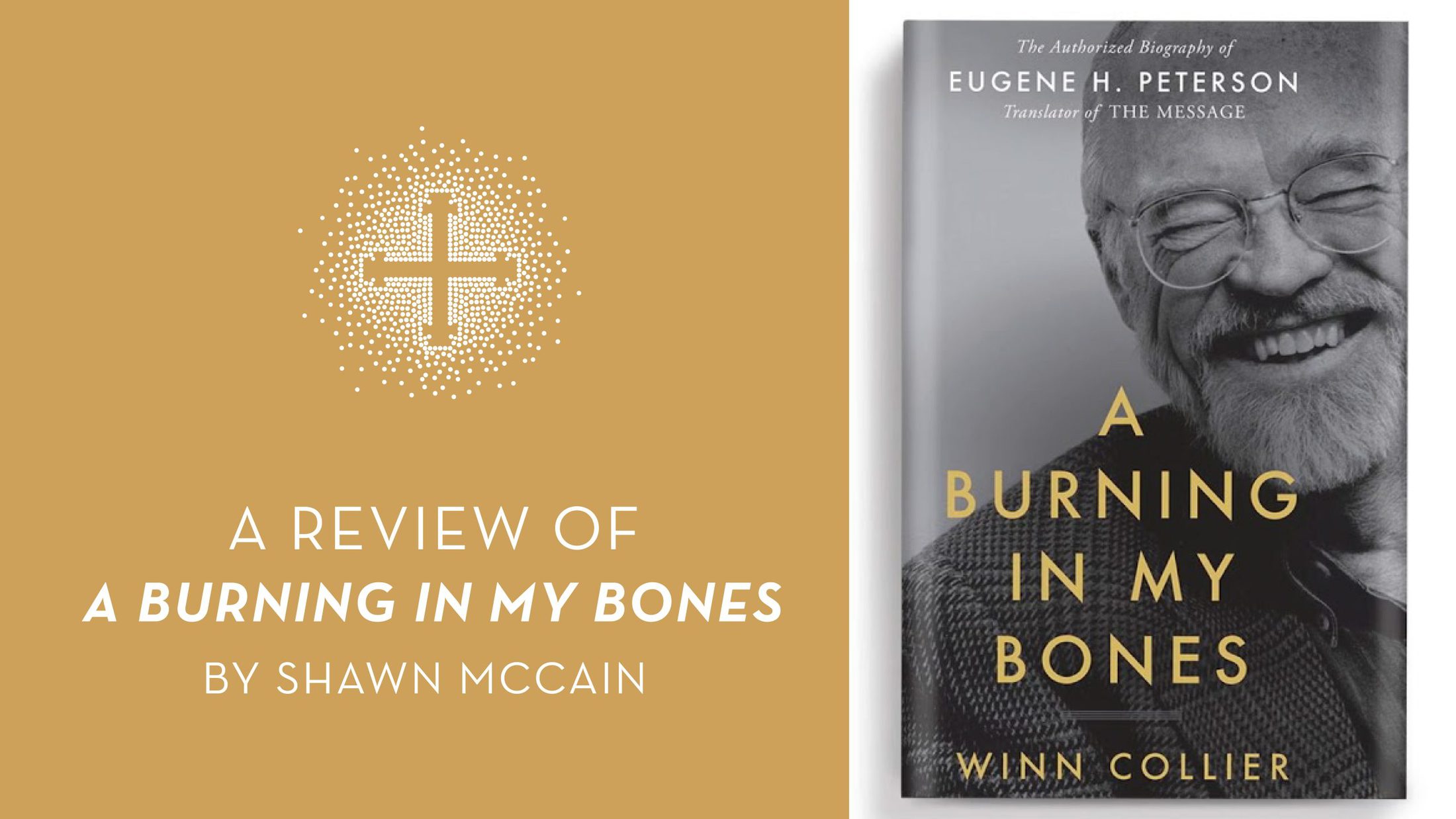By Shawn McCain
If you’ve ever heard Bishop Todd speak, he’s probably offered up selections from The Message by Eugene Peterson. What you may not know is that this work, which became one of Peterson’s greatest legacies, began as a pastoral response to his Baltimore parish over America’s racial sins. In the mid-1960s, the Holy Spirit told Peterson “his job was to fight racism in the suburbs.” So he led a study in Galatians with his mostly white parish, using his fresh, conversational and poetic paraphrase of the text.
Crucial details like this are part of what makes A Burning in My Bones, the new biography of the late pastor-writer, so interesting. Throughout the book, author Winn Collier carefully places Peterson’s life in a colorful, transparent and moving narrative reconstructed from conversation, journals and storytelling by his family and other close friends. On nearly every page there is something any pastor, pastor’s spouse/family, writer, academic or layperson can relate to.
From the Tolkien-esque map of Peterson’s Montana home on the introductory pages, to the story of his discovery of the “wonder, beauty and artistry” of scripture that never subsided, to his struggle with often feeling over-crowded in life without the necessary space to be a pastor/writer—the pages turned themselves. If you’ve ever led a parish, you can relate to his bold attempt at resigning from “running this damn church,” which he felt was incompatible with his call to be a pastor: “I’ve tried not to work so hard, but I can’t do it. I resign” (p. 149). When his elders asked what he really wanted, what he shared brought me to tears.
I want to be a pastor who prays…I can’t do that on the run…I feel too crowded. I want to be a pastor who reads and studies….I want to be a pastor who has time to be with you in leisurely, unhurried conversations…I want to be a pastor who leads you in worship…I want to have the time to read a story to Karen [his daughter]…I want to be an unbusy pastor (p. 150).
Also a church planter, Peterson felt the pressure to build up a church, get published and achieve all the metrics of ministry success. I pictured him as a natural contemplative, but to my surprise, he only became one through discipline to subdue his insatiable desire to achieve. He found himself at a crossroads: “Would he be true and live a life of fidelity to God, or would he become a prostitute pastor, a prostitute writer?” (p. 171).
Collier shared Peterson’s struggles in a way that humanized him and made him accessible: his long-running question over drinking too much bourbon; familial and marital strain; and a season of ministry hardship which he called “the badlands.” The way Peterson faced ministry challenges was also insightful. When writing about the division in his church over homosexuality: “This dividing the church because we don’t like or approve of some of our friends or neighbors is a far more serious heresy than anything posed by same-sex issues…I don’t think as pastors we are called to be God’s policemen” (p. 284). This was followed by an otherwise unpublished 2011 letter (not the controversial Religion News Service interview) outlining six insightful and (helpfully) complexifying points of consideration regarding homosexuality and the Church. On such a polarizing issue, Peterson affirmed a historic view of marriage while pressing that “a faithful reading of Scripture indicates that Jesus seems much more interested in those who are hurting than he is in those who think they have Scripture on their side” (p. 287).
On this and other points, Peterson resisted “taking a position” or issuing public statements. Here I noticed his struggle with wisdom and witness. Wisdom helped him resist public antagonisms and return to a hidden life with God, while his public witness sometimes left me with the impression that beyond his local parish, he had the luxury of not speaking up on certain issues. For parish pastors today, this is still a live question, one that would benefit from entering Peterson’s story.
In the end, the “burning” in Peterson’s bones was a life-long hunger to have a deep and uncrowded life with God—immersed in the reality of scripture, silence and prayer, and present to his family. This is why, for me (and perhaps for you, my colleagues), this book was a grace in rethinking my own pastoral call and ministry on the tail-end of one of the most challenging years of ministry to date.
 The Rev. Dr. Shawn McCain is a Latino priest and rector at Resurrection Anglican Church in South Austin, TX. He is husband to Michelle and father to six children. Shawn has a D.Min. focusing on a sacramental missiology from Nashotah House Theological Seminary.
The Rev. Dr. Shawn McCain is a Latino priest and rector at Resurrection Anglican Church in South Austin, TX. He is husband to Michelle and father to six children. Shawn has a D.Min. focusing on a sacramental missiology from Nashotah House Theological Seminary.

